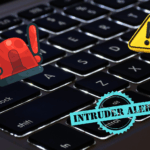Introduction
Your phone pings with another “security notice.” A pop-up flashes about a “new login from an unknown device.” Your inbox fills with system notifications you barely understand.
We’ve all been there. After a while, it’s easy to start tuning out these incessant disturbances. That mental exhaustion has a name: Alert fatigue.
Your IT guys aren’t the only ones who get notifications about odd system behavior and suspicious online activity. Whether you’re working from an office, a coffee shop, or your couch, those constant alerts — from your company software, your home Wi-Fi, even your personal accounts — can wear you down.
On the other hand, ignoring these notifications come with real risks too.
What Is Alert Fatigue?
Alert fatigue happens when we get so many warnings that we stop reacting to them. It’s a psychological response; our brains filter out repeated signals to protect our focus and energy. When it comes to cybersecurity, alert fatigue can mean ignoring the one notification that actually matters.
Unfortunately, bad actors know and rely on that exhaustion. How might that look for you?
- Frequent “password update” reminders
- Software prompts to restart your device
- MFA (multi-factor authentication) requests you have to approve
- Browser warnings about unsafe sites
- Security notifications from personal apps or smart devices
Each one might be harmless alone, but together, they build stress and fatigue — especially when they interrupt work or feel repetitive.
Why It Matters
Alert fatigue can create the perfect storm for cyber risk. When we become desensitized to warnings, we’re more likely to click through something dangerous or dismiss a legitimate threat. Attackers know this — in fact, they exploit it.
For example, look at MFA fatigue attacks. There, hackers repeatedly send login prompts hoping the victim will approve one just to stop the flood. It’s a tactic that worked in several high-profile breaches in recent years — all because people were overwhelmed by too many alerts.
Finding the Balance
You don’t have to choose between vigilance and well-being. The key is to make security habits automatic and sustainable, not stressful. Here’s how:
- Simplify your notifications. Turn off non-critical alerts, especially from apps or devices that aren’t security-related. Keep the ones that matter like login notifications, password change alerts, and updates from your IT team.
- Verify, don’t ignore. If something looks odd (e.g. a password reset email you didn’t request, a login attempt from another country, etc.) then take a moment to verify it through official channels before reacting. Pausing for 10 seconds beats hours of cleanup and stress later.
- Set security time, not security panic. Designate a few minutes each week to handle security tasks; like checking updates, reviewing device settings, or changing passwords. It turns security into routine maintenance instead of reactive stress and a huge mess.
- Embrace automation safely. Let your systems do some of the heavy lifting. Password managers, automatic updates, and built-in security features reduce how many decisions you have to make. Just make sure you’re using trusted, reputable and approved tools.
- Take mental breaks. Security vigilance works best when you’re alert and rested. Step away from screens when you can, mute non-urgent notifications after hours, and remember that healthy habits support secure behavior.
Conclusion
Alert fatigue reminds us that cybersecurity is still about people. Systems can issue warnings all day long, but it’s human attention that determines whether those alerts truly matter. Protecting your attention from exhaustion — by designing smarter systems, clearer messages, and balanced routines — is as critical as any technical firewall.
You don’t have to be a cybersecurity expert to protect yourself from alert fatigue. Just focus on what matters, respond thoughtfully, and build habits that make vigilance part of everyday life. Cyber hygiene shouldn’t put you in a constant state of stress.
Because when security feels sustainable, it becomes so much stronger!
The post Beating Alert Fatigue Without Losing Vigilance appeared first on Cybersafe.

